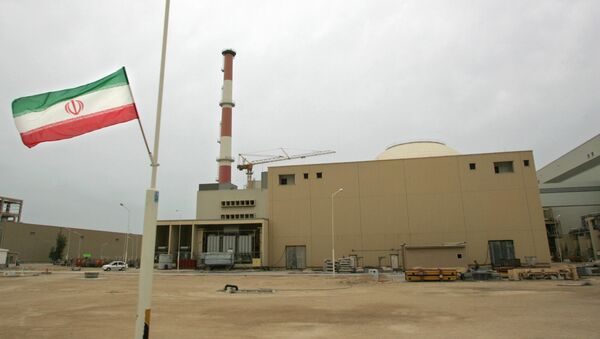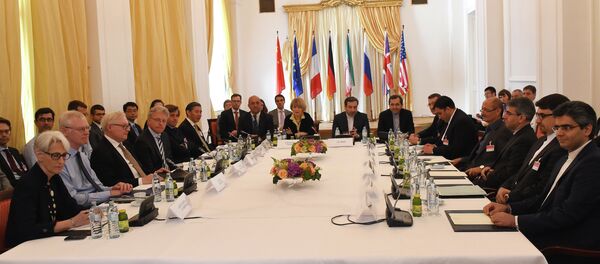VIENNA (Sputnik) — As the talks on Iran nuclear program have entered the final stage, experts told Sputnik that the agreement which would put an end to the decade-long stand-off would eventually benefit everyone, as well as have a positive effect on the Middle East.
The deadline for reaching the deal is on June 30. As the chief diplomats of Iran and the P5+1 group of international negotiators visited Vienna over the weekend, it has become obvious that the sides will go past the deadline seeking to reach a deal, and that some of the questions remain unresolved.
Inspections
The West insists that it should have access to all sites, including the military locations, for inspections in Iran. Tehran believes the International Atomic Energy Agency (IAEA) should have access only to declared nuclear facilities.
Gareth Porter, a historian and author who has extensively written about Iran-related issues, told Sputnik that a compromise on the issue is likely to be found.
"I think that the compromise will be that Iran will agree to carry out strictly the Additional Protocol. The Americans will present that as victory and the Iranians will present that as victory," Porter said.
Porter stressed that the media misinterpret the meaning of the protocol, and so does the IAEA Director General Yukiya Amano.
"The additional protocol is very clear that the IAEA can carry out local environmental sampling in those sites that are not declared by Iran, that is what the additional protocol provides for the undeclared sites," Porter said.
According to Porter, Iran can say no to providing access for that purpose, having to instance offer an alternative way of carrying out that local environmental sampling in that instance.
"So in the end, the Iranians have a veto over any request of the IAEA for any undeclared site," according to Porter.
Sanctions relief
The lifting of sanctions imposed on Iran is yet another issue which appears to be unresolved, as well as the mechanism that will reimpose these sanctions.
Seyed Mohammad Marandi, a professor at the University of Tehran, explained Iranian positions saying that the cost of reconfiguring Arak and Fordow nuclear facilities needs to be compensated by the benefits of lifting sanctions. A step-by-step approach is required, but sanctions relief should come first.
"If the Americans don't lift the sanctions, and Iran has re-configurated its installations, it will take years to bring it back to what it was before. So the Iranians are saying: ‘look, if we are going to make any changes, we have to see you doing the same.’ The Iranians want a good deal," Marandi told Sputnik.
Gareth Porter, however, noted that in any case the relief of sanctions will benefit both — the United States and Iran.
"Both sides will say that they achieved what they wanted," Porter said.
According to Porter, the return of sanctions would be ridiculous, as it would not make a difference if Iran were to violate the agreement.
"The real issue then is whether the United States will use military force. What good does it do to reinstate sanctions if Iranians have demonstrated that they intend on having nuclear weapon?" Porter said.
Influence on Middle East
The prospect of signing the deal also raises the issue of what effect it can have on the situation in the whole Middle East region.
While Porter said the deal is unlikely to change the situation in the region, Marandi claimed that "if there is a reasonable deal, it will have a very positive effect on the Middle East."
The analyst also said the United States should re-think its policy in the Middle East "and behave with a bit more wisdom, then they would not be so reliant on Saudi Arabia who has done so much damage to everyone."
The West has long accused Iran of trying to develop nuclear weapons under a guise of a civilian nuclear program, and imposed several rounds of sanctions against it.
In April, Iran and the P5+1 group of world powers, comprising Russia, the United States, China, the United Kingdom, France and Germany, worked out a political framework deal, ensuring the safe nature of the Iranian nuclear program and gradual lifting of the anti-Tehran sanctions.




